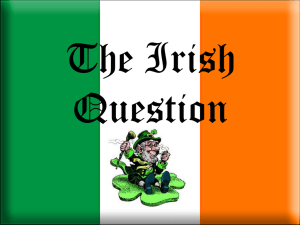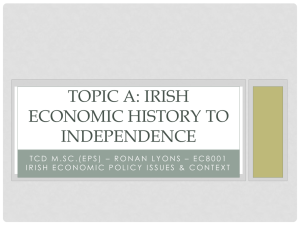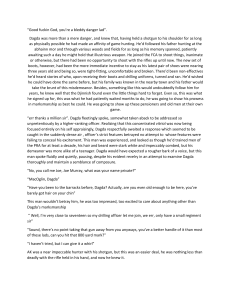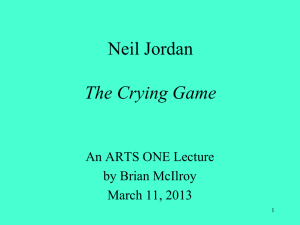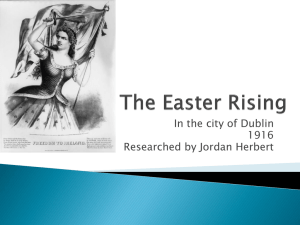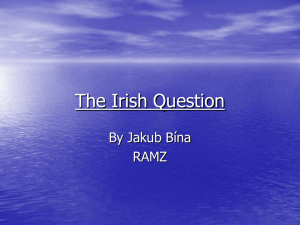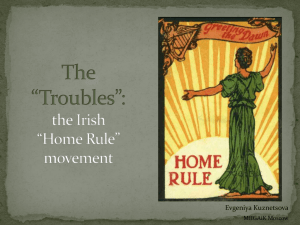Annette - WordPress.com
advertisement
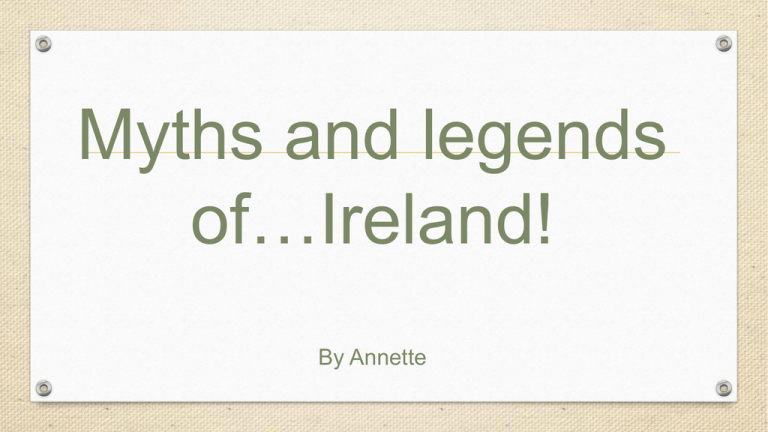
Myths and legends of…Ireland! By Annette Ireland is country with countless tales of myth and folklore. But none are more often repeated than the tales of leprechauns, selkies and the banshees. 1. Leprechauns Guard Irish Treasure • The Leprechaun is perhaps the most famous of all Irish legends. Said to be a type of fairy, the Leprechaun is a cobbler, making the shoes of all other fairy folk. Usually depicted as an old and bearded man, Leprechauns are never female. Legend tells that when the Danes invaded Ireland, the fairies hid all there treasure from the marauding hordes. The Leprechauns were given the task of guarding the treasure. Unfortunately, the rainbow always points to the location of the leprechauns treasure, so he must constantly be moving the trove. And with the climate in Ireland and plenty of rain, the rainbows are plentiful! It is said that if you catch a Leprechaun, he must either give you his treasure or grant you three wishes. The image and legend of the Irish Leprechaun has endured the ages and is very prevalent in western society today. 2. Selkies and Mermaids • The legend of the Selkie is very similar to the mermaid. But Selkies are brown seals by day and human by night. The legend comes from the numerous seals inhabiting the Irish coast. Sailors who caught a Selkie at night in human form married these lovely brown eyed maidens. For the rest of their lives, they would serve as patient wives, while constantly looking to the sea. If Selkies we released by their captors, they would return to the sea but would forever more guard human families while on the sea, and on land. The Banshee 3. The Cry of the Banshee • Banshee is another name for a Irish Fairly Woman. Tied to earthly families or clans, the banshee stands watch over their clans. When a member of the clan or family dies, the Banshee cries and mourns the death. Original legends do not have the Banshee coming to take the living, but mourning the death of a human family member. Banshees are depicted as both old ugly women and young attractive girls. 4. Changelings • As legend has it, female fairies often give birth to deformed children. Since the fairies prefer visually pleasing babies, they would go into the mortal world and swap with a healthy human baby, leaving behind a changeling. While the changeling looked like a human baby, it carried none of the same emotional characteristics. The changeling was only happy when misfortune or grief happened in the house. The changeling legend has lasted for centuries. William Shakespeare talks of a changeling in his play, “A Midsummer’s Night Dream.” Three hundred years later, Scarlett O’Hara believed Rhett Butler’s illegitimate child was a changeling in “Gone with the Wind.” 5.Dagda’s Harp • In Irish mythology, the Dagda was a high priest who had a large and beautiful harp. During a war, a rival tribe stole Dagda’s harp and took it to an abandoned castle. Dagda followed the tribe and called to the harp. The harp came to Dagda and he struck the chords. The harp let out the Music of Tears and everyone in the castle began to cry. Dagda struck the chords again and the harp played the Music of Mirth and all the warriors began to laugh. Then, Dagda struck the chords a final time and the harp let out the Music of Sleep. Everyone but Dagda fell into a deep sleep, allowing him to escape with his magical harp unharmed. 6. The Children of Lir • The story of the Children of Lir comes from the Irish Mythological Cycle. Lir was the lord of the sea. He had a wife and four children. When Lir’s wife died, he married his wife’s sister, Aoife. Aoife was jealous of Lir’s children and wanted to be rid of them. One day Aoife took the children to a lake. While they were swimming she performed a spell on them and turned them into swans. Under the spell the children were to remain swans until they heard the sound of a Christian bell. The swans swam from lake, to river to stream for years waiting for the sound of that bell, but it wasn’t until St. Patrick came to Ireland that the children could be free of the curse- 900 years later This was St. Patrick. 7. St. Patrick • To most people, St. Patrick is the man who brought a day of good times and green beer to pubs across the world. In reality, St. Patrick wasn’t made a saint until centuries after his death and he wasn’t even Irish. St. Patrick was born in Britain to a wealthy family. During his childhood, he was kidnapped and sold into slavery in Ireland. During his years in slavery he converted to Christianity and once freed he did spend the rest of his life teaching the Irish about the Christian religion, but he was soon forgotten after his death. It wasn’t until many years later that monks began telling the tale of St. Patrick forcing all the snakes out of Ireland. Something he never could have done as there never were any snakes in Ireland. 8. The Shamrock • The three green leaves of the Shamrock is more than the unofficial symbol of Ireland and one of the marshmallows in Lucky Charms. The Shamrock has held meaning to most of Ireland’s historic cultures. The Druids believed the Shamrock was a sacred plant that could ward off evil. The Celtics believed the Shamrock had mystical properties due to the plant’s three heart-shaped leaves. The Celtics believed three was a sacred number. Some Christians also believed the Shamrock had special meaning- the three leaves representing the Holy Trinity. Finn MacCool 9. Finn MacCool • Finn MacCool is a mythological warrior that appears in several Irish legends. One popular story tells of a salmon that knew all of the world’s knowledge. Finn decided to eat the Salmon to gain the knowledge. As he was cooking the fish, juice squirted out and burned Finn’s thumb. Finn stuck his thumb in his mouth to stop the pain and instantly learned the knowledge the salmon carried. From then on, anytime Finn sucked his thumb he gained whatever knowledge he was seeking. 10. Pookas. • The Pookas are a certain type of fairy- one bent on creating havoc in the mortal world. The Pooka appeared at night across rural Ireland and the seaboard. On a good day, the Pooka would cause destruction on a farm- tearing down fences and disrupting the animals. On a bad day, the Pooka would stand outside the farmhouse and call the people outside by name. If anyone came out, the Pooka would carry them away. The Pookas also loved to mess with the ships pulling away from Ireland, and were blamed for many shipwrecks along the rocky coast. 11. Faeries • Faeries exist in some form in mythology all over the world but hold a special importance to the Irish. The fairy society in Ireland is thought to be very much alive, and far from Peter Pan’s Tinker Bell. An Irish fairy can take any form she wishes, but will usually choose a human form. They are said to be beautiful, powerful and hard to resist, which is unfortunate because most fairies in Ireland love to bring misfortune and bad luck to the mortals who come near them. THE END!!! • Sources for pictures : Google Images • Sources for Information: www.toptenz.net , www.ireland-now.com
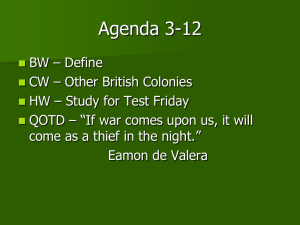
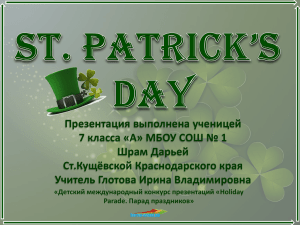
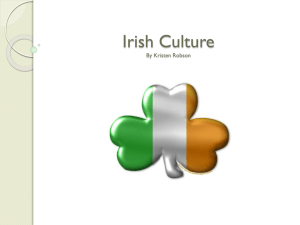
![South east presentation resources [pdf, 7.8MB]](http://s2.studylib.net/store/data/005225551_1-572ef1fc8a3b867845768d2e9683ea31-300x300.png)
